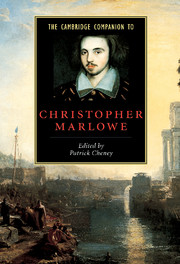Book contents
- Frontmatter
- 1 Introduction: Marlowe in the twenty-first century
- 2 Marlowe’s life
- 3 Marlovian texts and authorship
- 4 Marlowe and style
- 5 Marlowe and the politics of religion
- 6 Marlowe and the English literary scene
- 7 Marlowe’s poems and classicism
- 8 Tamburlaine the Great, Parts One and Two
- 9 The Jew of Malta
- 10 Edward II
- 11 Doctor Faustus
- 12 Dido, Queen of Carthage and The Massacre at Paris
- 13 Tragedy, patronage, and power
- 14 Geography and identity in Marlowe
- 15 Marlowe’s men and women
- 16 Marlowe in theatre and film
- 17 Marlowe’s reception and influence
- Reference Works
- Index
- Series list
- Plate section
2 - Marlowe’s life
Published online by Cambridge University Press: 28 May 2006
- Frontmatter
- 1 Introduction: Marlowe in the twenty-first century
- 2 Marlowe’s life
- 3 Marlovian texts and authorship
- 4 Marlowe and style
- 5 Marlowe and the politics of religion
- 6 Marlowe and the English literary scene
- 7 Marlowe’s poems and classicism
- 8 Tamburlaine the Great, Parts One and Two
- 9 The Jew of Malta
- 10 Edward II
- 11 Doctor Faustus
- 12 Dido, Queen of Carthage and The Massacre at Paris
- 13 Tragedy, patronage, and power
- 14 Geography and identity in Marlowe
- 15 Marlowe’s men and women
- 16 Marlowe in theatre and film
- 17 Marlowe’s reception and influence
- Reference Works
- Index
- Series list
- Plate section
Summary
Christopher Marlowe's contemporaries recalled a conflicted figure. 'Pity it is that wit so ill should dwell', wrote a student playwright at Cambridge, 'Wit lent from heaven, but vices sent from hell.' Other living witnesses lined up on either side of this divide. The poet George Peele called the dead playwright 'the Muses' darling'. William Shakespeare hailed the author of the magical verse, 'Who ever loved, that loved not at first sight?' Ben Jonson praised the inventor of 'Marlowe's mighty line'. Michael Drayton, another poet, proclaimed that Marlowe 'Had in him those brave translunary things, / That the first Poets have'. Marlowe's enemies were just as adamant about his vices. During the months leading up to Marlowe's death, the pamphleteer Robert Greene publicly predicted that if the 'famous gracer of tragedians' did not repent his blasphemies God would soon strike him down. Just a few days before Marlowe was murdered, the spy Richard Baines informed Queen Elizabeth's Privy Council that the playwright was a proselytizing atheist, a counterfeiter, and a consumer of 'boys and tobacco'. Protestant ministers viewed Marlowe's violent end in his twenty-ninth year as an act of divine vengeance. Marlowe had 'denied God and his son Christ', declared Thomas Beard, 'But see what a hook the Lord put in the nostrils of this barking dog.'
Four hundred years later, we can agree about Marlowe’s artistic genius, but the story of his wayward life remains elusive. He left no first-person utterances behind for us to interpret (the sole exception is a cryptic Latin dedication to the Countess of Pembroke). The facts of his adult life are few, scattered, and of doubtful accuracy. Only one of his works was published during his lifetime, and his name appears nowhere on the text. Despite his many encounters with the law, Marlowe seldom went to trial and was never convicted of anything.
- Type
- Chapter
- Information
- The Cambridge Companion to Christopher Marlowe , pp. 24 - 40Publisher: Cambridge University PressPrint publication year: 2004
- 3
- Cited by



